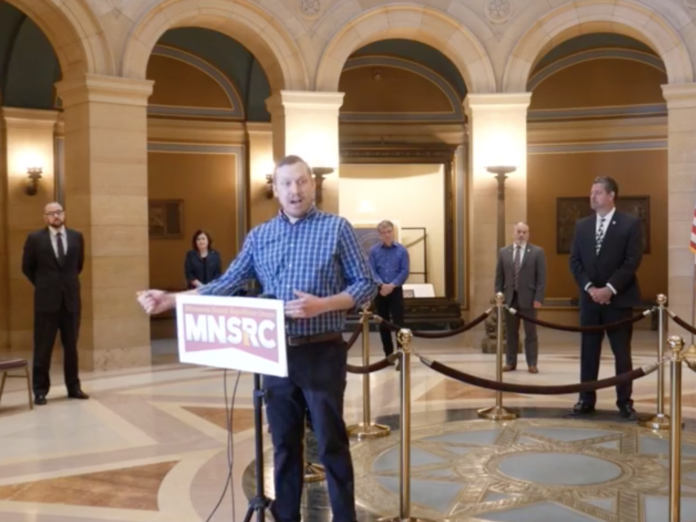Minnesota Senate Republicans held a press conference to give a voice to small business owners who desperately need the state’s economy to reopen.
The Senate Republicans have been taking suggestions and hearing feedback from struggling Minnesotans for weeks. On Monday, legislators gave their desperate constituents a platform in St. Paul, holding a media event beneath the Capitol’s central rotunda.
The event lasted for about 45 minutes and included statements from Senate Majority Leader Paul Gazelka, State Representative Eric Pratt, a pastor, and a handful of small business owners who say they can modify their operating procedures to facilitate a safe reopening of the economy.
Senate Republicans and business owners hold a press conference to Open Minnesota Up Again
Tune In! Senate Republicans and business owners hold a press conference to Open Minnesota Up Again
Posted by Minnesota Senate Republican Caucus on Monday, May 4, 2020
“People are scared, frustrated, anxious, impatient, tired, stressed, and hopeless. They are counting on us to get this right,” Gazelka remarked. Pratt built on the Majority Leader’s sentiment adding that “government loans that need to be repaid is not enough. Extended unemployment benefits are not enough.”
“These small, local businesses can open to the public in a manner that is probably safer than many big box stores are doing right now,” he said.
Matt Winter, who owns Plate Restaurant in Prior Lake, echoed Pratt’s belief that businesses can function safely even amidst COVID-19. “We can do this safely. Health is important, but health is more than life or death,” Winter said, highlighting that putting Minnesotans out of work and small employers out of business will have long-reaching negative effects.
When pressed by a journalist in attendance about how exactly Plate could reopen safely, Winter responded listing several practices that his restaurant is ready to implement. These include procedures to eliminate all contact between servers and guests, distancing between tables and frequent sanitation.
Ray Herrington owns several bars, restaurants and a live theater in St. Cloud. He has faith in his patrons to make the right decisions. “There a good chance that if we’re doing something wrong [in terms of safe operating procedures], we’ll hear about it, not just from government, but from customers,” he speculates.
Andrew Hulse, owner of 18/8 Fine Men’s Salons in Maple Grove and Wayzata says that he would never ask his employees to step into the line of danger, and that salons are already adept at “infection control” and sanitation which should enable them to reopen safely.
On March 17, Minnesota Governor Tim Walz’s original order to shutdown a large swath of his state’s economy went into effect. This proclamation was subsequently extended to last at least through May 4. After the governor teased the idea of a second extension, he dropped the hammer on this initiative last week. The Minnesota economy is now to remain closed through May 18, leaving hundreds of thousands workers without pay for over 60 days.
Not only will this likely have a significant effect on small businesses, many of which have already gone under, but some experts believe that a wave of literal depression may follow the shutdown-induced economic depression.
Mentions of the virus in conversations with mental health crisis lines have increased drastically. One such crisis line reports that 10% of the individuals they’ve dealt with recently cite the financial impact of the COVID-19 related closures as their reason for breaking down.
Struggling workers have said things like “this virus might make my family homeless. My husband’s job might cut hours or close, and I’m disabled. It’s all too much to deal with,” according to the crisis line.

















